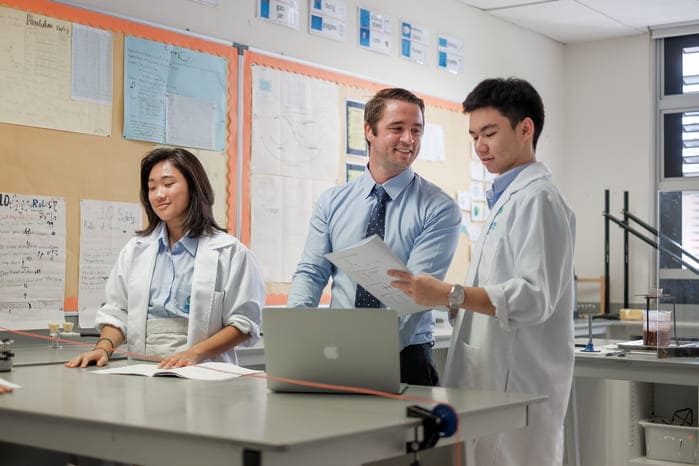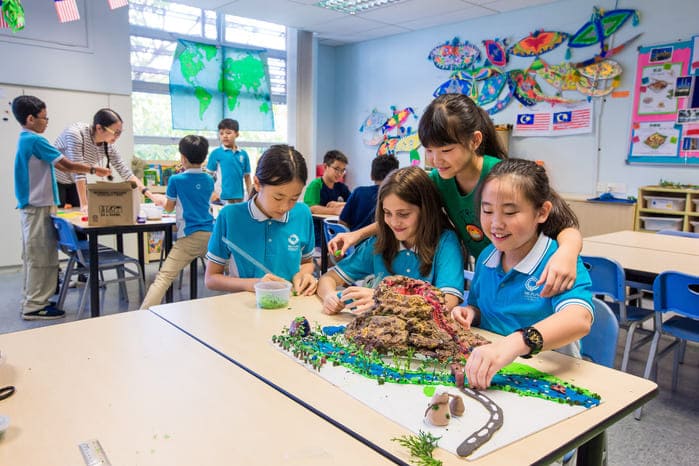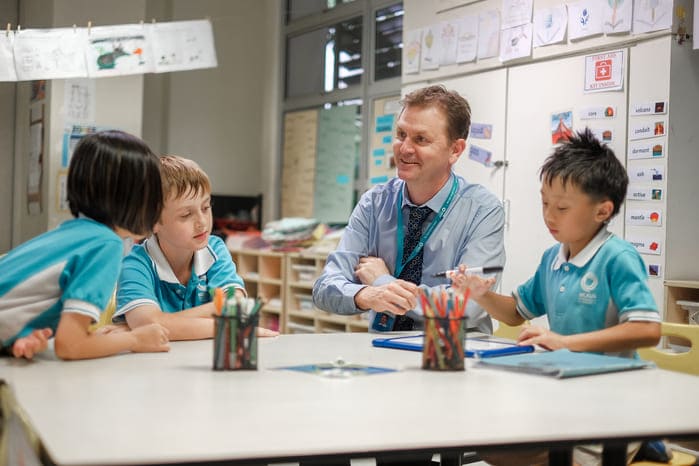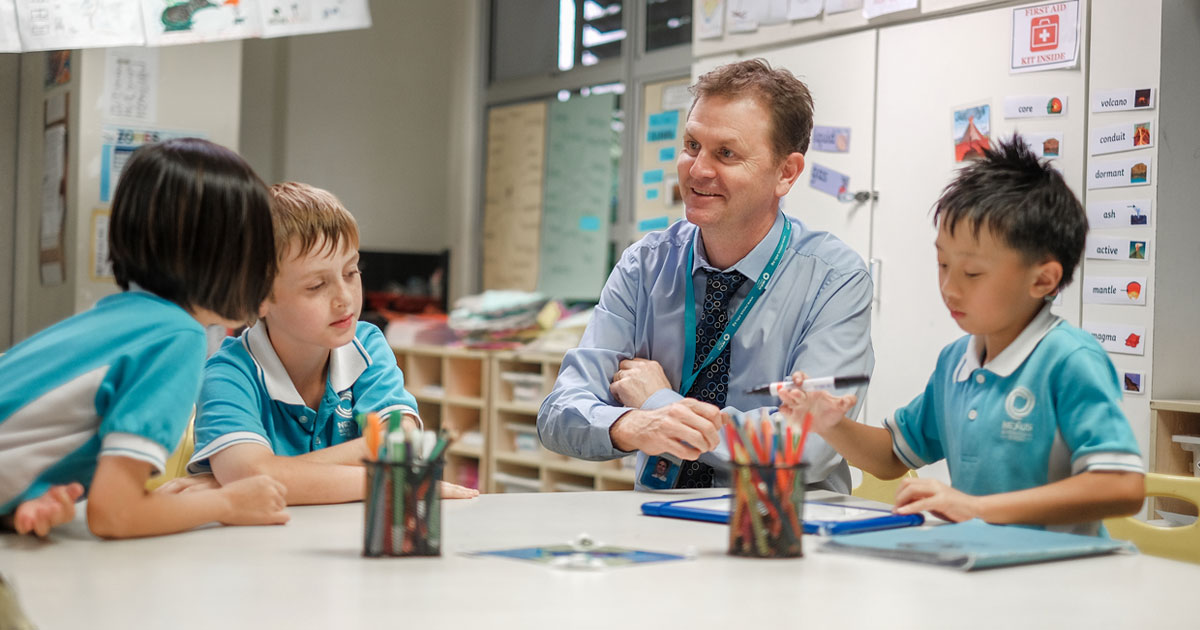Nexus Principal David Griffiths on Technology’s Influence in Education
 Schooladvisor Team
Schooladvisor TeamThe most significant outcome of a technology-enabling international school is for the students to apply what they have learned to give back to society in numerous ways. Find out how Nexus handles technology integration in learning and how students use what they have learned tangibly and make it accessible to everyone.
Nexus International School’s Principal, Mr David Griffiths, is a veteran in the education industry. With 30 years of accumulated experience, his vision and mission are to use technology when there is a positive impact on improving learning.
In the second part of School Advisor’s interview with Mr Griffiths, he shares his thoughts on the role of technology in education at Nexus and how the students feel empowered to make an impact in the community using technology.
To learn more about Mr Griffiths, his outlook on education and his role at Nexus, head to the first part of this article.
A technology-enabling international school
Technology has played a significant role in the classrooms at Nexus, and it has helped teachers make learning an exciting and positive experience for their learners. The school had seen learners quickly adapting to online learning when the pandemic first struck the country. Mr Griffiths noted that the many innovative teaching methods established through Nexus’ ‘Continuation of Learning’ programme had helped make learning online feel similar to but not the same as learning in the classroom.

The adoption of technology in learning at Nexus has created students who are capable to adapt to the rapid changes of the 21st century.
Since 2014, Nexus has joined 535 schools worldwide as an Apple Distinguished School, proving that Nexus is amongst the most innovative schools in the world. Classrooms at the school are equipped with the latest technological devices such as iPad Pros and Virtual Reality (VR) headsets. In an effort to help children to familiarise the students with learning using technology, Nexus became one of the first schools in Malaysia to launch a 1-1 Apple device programme for its upper primary and secondary learners. However, Mr Griffiths stresses that these devices are only used when they improve learners’ experience in the classroom.
“When teachers tell me the class requires VR headsets or iPads in the classroom, my first question is, ‘Do these devices improve learning?’ If it is proven that these devices can improve learning, we will invest in it,” Mr Griffiths clarified.
Mr Griffiths understands the concerns surrounding the children’s safety when they are exposed to technology and the Internet. “We can’t bury our heads in the sand and ban the use of technology because of what children might do with it. So we must educate our learners to make the right choices.”
There is a strong discipline that is engrained at Nexus. He said it is a responsibility for the educators at Nexus to ensure both parents and learners are aware of online safety: parents attend many workshops run by the teachers and leaders of IT at the school and all new learners attend online safety talks and instruction during their induction.
Making A Difference In Society
Nexus learners are skilled with IT, thanks to the integration between learning and technology during their learning journey at Nexus. With the knowledge they gain in school, these learners have made a difference in society in their unique ways.
“Our alumni are doing great things with technology. Some former learners started their own gaming company, while another couple of ex-Nexus learners had the fantastic idea of hosting social events using VR during the recent lockdown in Malaysia,” Mr Griffiths said.
Some ex-learners recognised that the pandemic affected learning for children in the community outside of Nexus and international schools. They devised a way to help alleviate the difficulties learners were facing. Mr Griffiths further explained, “Some of our innovative alumni have recently set up a non-profit organisation called ‘Rakan Tutor’ where volunteers can offer to conduct online learning for others who otherwise may not have been able to continue their education. This epitomises the Nexus Way elements of Innovation, Inclusion and Relationships.” Another current Year 9 learner at Nexus, Andrew Kuik, has recently organised and performed in an online charity concert, successfully raising RM35,000.
Joseph Chung, in Year 13 created a mobile application that notifies parents if their children face difficulties of overheating in the car. “Joseph saw the need for such an app after reading an article that covered a tragic case where a child had overheated when left in the car. He wanted to ensure that this didn’t happen again and felt it was something that he could help make a positive difference in the world.” Joseph is currently in his final year of Nexus’ International Baccalaureate (IB) Diploma Programme and has also participated in IMU’s Virtual Science and Discovery Challenge.
“The atmosphere and safe environment at Nexus afford learners the confidence to use their knowledge and skills of innovation together with an understanding of the world and a desire to make a difference,” Mr Griffiths said. He explained that Primary learners at Nexus also initiated and now host a Global Children’s Conference, which involves learners from the UK, Egypt, America, Australia and Singapore. The children debate and share their views on themes such as, ‘How to survive in the pandemic’, ‘Why is it important to embrace diversity?’ and ‘How can kindness change the world?’. Hosted by learners at Nexus, Putrajaya, learners from around the world, including Nexus, Singapore shared their experiences and tips.
Mr Griffiths goes on to explain, “It is incredible to see our ten-year-olds not only speaking to such a wide audience but also taking on the responsibility for setting up and overseeing the logistics of such a large event. Our children begin to think about their capabilities and desire to make a difference in the world. That is what we want: we want our learners to be ambitious about what they are capable of.”

Nexus students at all levels are highly capable of their endeavours.
Academically, Nexus’ learners have flourished after graduating from the school’s IBDP programme. 16 of the 35 Nexus’ IBDP graduates achieved 40 points and above, and two learners earned 45 points, a perfect score. Recently, Nexus ranked in the top 2% in the World and Top 50 schools in Asia, simultaneously making Nexus the top IBDP school in Malaysia with a 100% pass rate — higher than the world average of 89%.
Inclusivity, The Nexus Way
Nexus celebrates the differences in learners. Through the Nexus Way, the school wants to ‘embrace diversity and challenge minds’ of the learners, allowing the school to conduct a child-centred learning experience.

The Nexus Way encapsulates Nexus' ideas to develop capable, ethical and responsible persons.
“At the start of every year, we will have an induction talk with all of our staff and share plans and priorities for that year. Then, we review those plans and priorities termly,” Mr Griffiths shared.
The school has a dedicated team that looks into the development of the elements of the Nexus Way: Inclusion, Innovation, Mindsets and Relationships. The meetings that take place, too, do not exclude anyone and ”that becomes part of the way we are at school”. He added, “We make sure our teachers have enough professional training and understanding of The Nexus Way elements. We have our own professional learning communities.”
Many learners at Nexus come from different walks of life and require different learning needs. As well as challenging those exceptional learners to meet their targets, the school provides learning support with Learning Support Specialists on campus for students who require additional support and help them continue to be challenged alongside their peers.
Mr Griffiths explained, “Every teacher has a meeting with families at the start of the year to understand the needs and challenges of every learner so they are able to understand how they can help them to add value to their academic successes.”
He also shared how the school handles conflicts by utilising the Restorative practice. This involves three basic questions, which are listed on Nexus community’s ID tags:
- What happened?
- Who has been harmed or hurt?
- What is the method to make things right?
“If we are faced with a conflict, we automatically try to resolve it in this way, and everyone knows how restorative practise works.” Mr Griffiths explained how it is important to plan conflict resolution and ensure everyone is respectful to one another. The ideal of assuming positive intent is always present to help everyone to work towards the same goal of improving children’s learning experiences and outcomes.
Since its inception, Mr Griffiths has been at the forefront of Nexus. He has actively and positively impacted learners’ lives through his warmth and eagerness to change the education landscape and make it accessible to every learner. But, more importantly, he is making learning enjoyable again for everyone, and this is the Nexus Way of empowering, innovating and leading Nexus to greater heights.
School Advisor empowers parents to make the right choices with Malaysian schools and more! We provide a comprehensive list of the best international school and private schools that offer preschool, American and British curriculums, International Baccalaureate, A-Levels and more that will satisfy your child's academic and co-curricular growth.
Follow us on Facebook, Instagram and Twitter to keep up with the latest news from us and on education and parenting!

